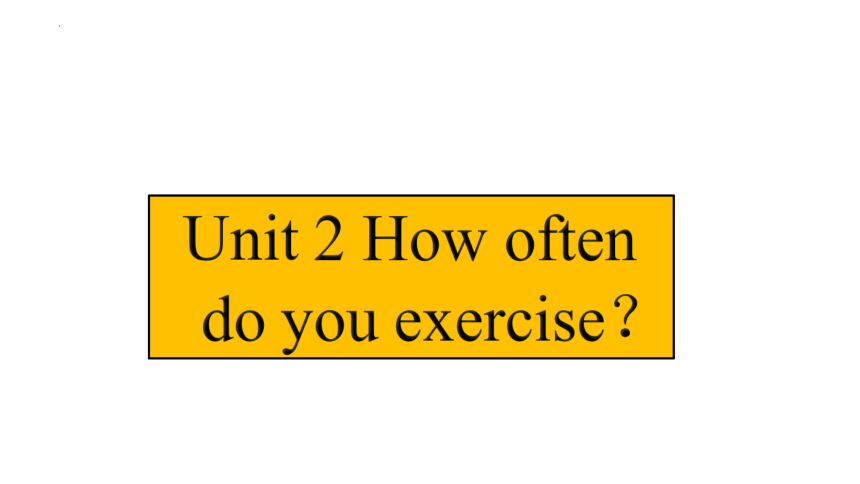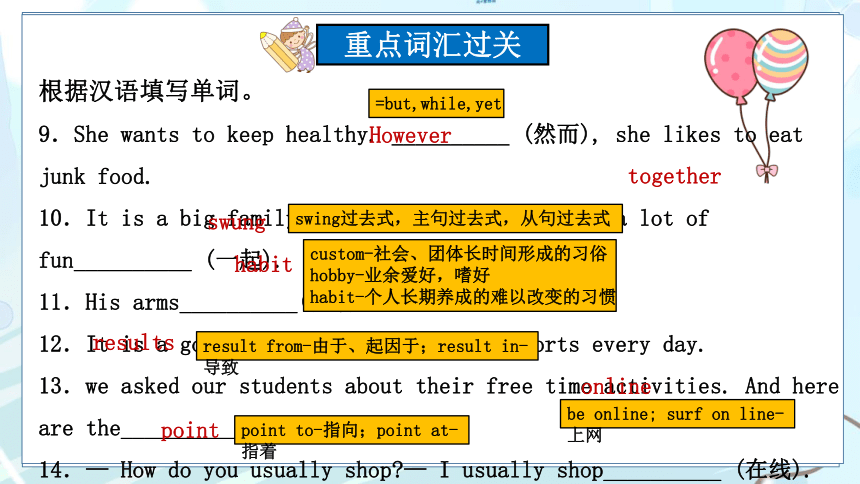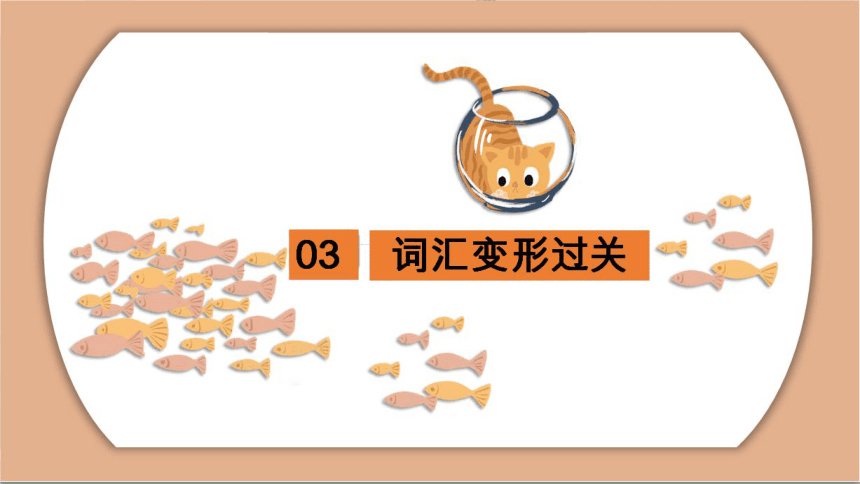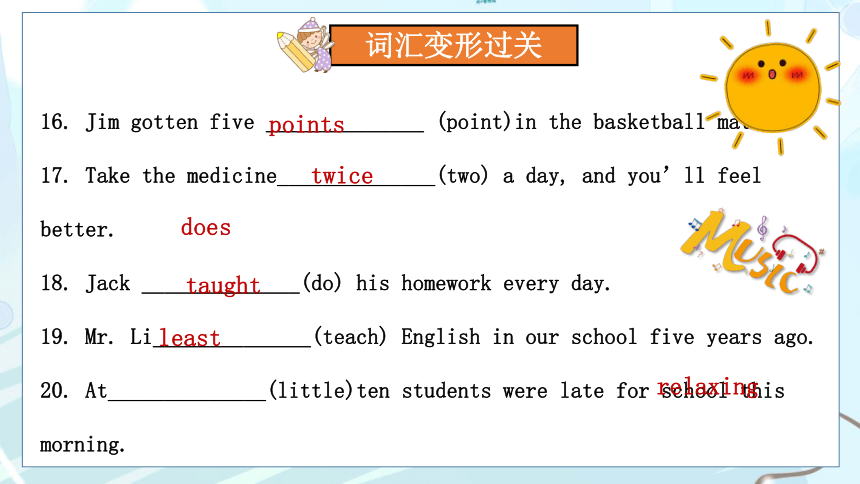Unit 2 How often do you exercise?单元知识点复习 课件(共34张PPT) 2024-2025学年八年级英语上册(人教版)
文档属性
| 名称 | Unit 2 How often do you exercise?单元知识点复习 课件(共34张PPT) 2024-2025学年八年级英语上册(人教版) |

|
|
| 格式 | pptx | ||
| 文件大小 | 9.4MB | ||
| 资源类型 | 教案 | ||
| 版本资源 | 人教新目标(Go for it)版 | ||
| 科目 | 英语 | ||
| 更新时间 | 2024-10-31 00:00:00 | ||
图片预览












文档简介
(共34张PPT)
Unit 2 How often
do you exercise?
01
重点词汇过关
Unit 2 How often do you exercise
重点词汇过关
根据图片填写单词
1.Do you often help your mother with ____________before bed
2.I exercise to keep my ___________ healthy.
3.Students can learn about a lot of traditional culture by watching some TV ________before bed.
4.I don’t like to drink ________before bed because I can’t stand it.
5.Mo Yan wrote many popular books. He is my favorite _______before bed.
6.Tom was afraid of going to the ________before bed , but he had to.
7.In her free time, she likes reading __________and newspapers.
housework
body
program
coffee
writer
dentist
magazine
不可数名词,没有复数
身体的躯干,还有主体的意思
program复数后加S
液体,不可数名词
动词+er
work (工作)加-er变成 worker (工人)
sing (唱歌)加-er变成 singer (歌手)
teach (教)加-er变成 teacher (教师)
read (阅读)加-er变成 reader (读者)
drive (驾驶)加-er变成 driver (司机)
artist :art(艺术)+ ist(…的人)= 艺术家
scientist :sci(科学)+ ent(…的)+ ist(…的人)= 科学家
journalist :journal(日志,新闻)+ ist(…的人)= 记者
重点词汇过关
根据汉语填写单词。
1.You should look _______(从头到尾) the questions first when having a test.
2._________ (或许) he will call you tomorrow.
3.Drinking too much coffee is bad for your_______ (健康).
4.I _________ (几乎不) ever travel. As you know, I don’t have enough time.
5.I__________ (曾经) cooked a dish for my mother and it tasted good.
6.We should brush our teeth__________ (两次) a day. It’s good for our teeth.
7.Do you __________ (介意) opening the window It’s too hot.
8.He _________ (很少) goes to the park.
through
Maybe
health
hardly
once
twice
mind
seldom
1.look up 查找 ; 向上看
2.look like 看上去像
3.have a look 看一下
4.look forward 期待
=perhaps
形容词 healthy
hardly -副词,几乎不;hard -形容词 努力的,坚硬的
once 做曾经讲一般用过去时; once-一次
once-一次;twice-两次;three times 三次
mind+动词ing
频度副词-usually, often, always,never,hardly
重点词汇过关
根据汉语填写单词。
9.She wants to keep healthy. __________ (然而), she likes to eat junk food.
10.It is a big family and I’m sure we’ll have a lot of fun__________ (一起).
11.His arms__________(摆动) as he walked.
12.It is a good__________ (习惯) to do sports every day.
13.we asked our students about their free time activities. And here are the__________ (结果).
14.— How do you usually shop — I usually shop__________ (在线).
15. Don‘t _________(指着) at people with a finger.
However
together
swung
habit
results
online
point
=but,while,yet
swing过去式,主句过去式,从句过去式
custom-社会、团体长时间形成的习俗
hobby-业余爱好,嗜好
habit-个人长期养成的难以改变的习惯
result from -由于、起因于;result in -导致
be online; surf on line-上网
point to-指向;point at-指着
1. help with housework 帮助做家务
2. hardly ever 几乎不
3. on weekends 在周末
4. do sports=play sports 进行体育锻炼
5. once a week 每同一次
6. at least twice a month 至少一月两次
7. three times a year 一年三次
8. use the internet= go online 上网
9. go to the movies 去看电影
10. how often 多久一次
短语识记过关
11. favorite program 最喜爱的节目
12. animal world 动物世界
13. next week 下周
14. be free 有空
15. be full for somebody 对某人来说很忙碌
16. be full of something 装满了……
17. have piano lessons 上钢琴课
18. what kind of dance 什么种类的舞蹈
19. swing dance 摇摆舞
20. play tennis 打网球
on weekends-在周末,表泛指
on the weekend-在这个周末,是特指
可用how often提问
回答:once a week, twice a year
be filled with…
球类前面不加the
21. go to bed early 早早上床睡觉
22. a healthy breakfast 一顿健康的早餐
23. stay up late 熬夜到很晚
24. after school 放学后
25. be good/ bad for…对……有好/坏处
26.Good eating habits 好的饮食习惯
27.junk food 垃圾食品
28.go camping 在乡村野营
29.free time activities 空闲时间活动
30.fifteen percent of ….15%的……
短语识记过关
31.not at all 没关系
32.for fun 为了娱乐
33.game shows 游戏节目
34.the most popular 最受欢迎的
35.such as 诸如……
36.watch TV 看电视
37.go to the dentist 去看牙医
38.teeth cleaning 牙齿的清洁
39.almost every day 几乎每天
after class下课后
go fishing, go boating,
go swimming, go running,
go skating, go skiing,
go hiking, go climbing,
go sightseeing..
fun-funny
= for example
=go to the
dentist's clinic(诊所)
boring
1. one (num. 一) — ________(adv. 一次) —________(第一)
2. two (num. 二) — ________(adv.两次)— ___________(第二)
3. swing (v. 使……摆动) —___________( 过去式)
4. little (adj. 少的) —_________(比较级:更少的) — _______(最高级:最少的)
5. health (n. 健康) —___________( adj. 健康的) —_______ (adv. 健康地)
— _______ (反义词:不健康的) — ___________(反义词:不健康地)
6. die (v. 死) —_______(n. 死亡) — _______(adj. 垂死的) — ______ (adj. 死的 )
7. write (v. 写) — ___________ (n. 作者;作家)
8.life— ________(复数)
词汇变形过关
first
once
second
twice
swung
less
least
healthy
healthily
unhealthy
unhealthily
death
dying
dead
writer
lives
wonderful
9.win—________(过去式)—________(过去分词)
10.finish— ________(单三形式)— ________(对应词)
11.myself— ________(主格)—________ (宾格)— ________ (形容词性物主代词)
12. Most parents don’t think it is _______(health)for children to stay up too late at night.
13. Lao She is a great _________(write)and he’s especially famous for his play, Teahouse.
14. If people don’t exercise, the illness can go into their _________ (body) easily.
15. It takes ________(little)time to go there by underground than by bus.
词汇变形过关
won
won
finishes
start
I
me
my
healthy
writer
less
bodies
wonderful
16. Jim gotten five ______________ (point)in the basketball match.
17. Take the medicine______________(two) a day, and you’ll feel better.
18. Jack ______________(do) his homework every day.
19. Mr. Li______________(teach) English in our school five years ago.
20. At______________(little)ten students were late for school this morning.
21. Many boys like playing football because they think it’s______________(relax).
词汇变形过关
points
twice
does
least
taught
relaxing
sometimes
sometime
some time
表示“某个时候”,可以是过去,也可以是将来-I saw him sometime last summer. 我去年夏天某个时候见过他。
some times
表示”有时候”,相当于occasionally,常做时间状语。 Sometimes I go to school on foot. 有时候我步行上学。
some times-表示“几次,几倍”。 l have read this novel some times.我读过这本小说好几次了。
”一段时间”- I need some time to think it over.
我需要一些时间来认真琢磨一下。
词汇辨析过关
词汇辨析
how come
why
简单的询问词,常用来询问原因或理由。
Why are you late 你为什么迟到?
Why did you do that 你为什么要这样做?
表示"为什么",但它常常用来表示不解或惊讶。How come you're late 你怎么迟到了?
How come you didn't tell me 你怎么没告诉我?
词汇辨析
no one
none
代词,可以指代人或物,意思是“没有一个,没有任何一个,没有人,没有什么”,通常与of连用,表示一定的范围或部分。 None of the books are interesting. 没有一本书是有趣的。
代词,只能指代人,不能指代物,意思是“没有人,谁也不”,不能与of短语连用,表示绝对的否定。
No one knows the truth. 没有人知道真相。
1.“几乎不”,表示否定含义,短语“hardly ever”意为“努力地”
词汇辨析
hardly
hard
“努力地” The ice is as hard as rock. 冰像石头一样硬。
“困难的;坚硬的” The old man is breathing hard.
这位老人呼吸困难。
“几乎不”,表示否定含义。
I could hardly refuse, could I 我很难拒绝,是不是
There was hardly any free time. 简直没有什么空闲时间。
词汇辨析
be good with
be good at
be good to
“擅长做…”,后跟名词、代词或动词ing形式作宾语。相当于do well in-He is good at telling jokes.他擅长讲笑话。
“对…好”,后面一般接人,相当于be friendly to…-Our head teacher is good to all of us. 我们的校长对我们都很好。
“与…相处地好”,后接sb.或sth. -He’s very
good with children.他和孩子们相处得好。
over
across
through
介词,“从事物表面横过”,
I went across the road.我穿过马路。
介词,“从事物上方越过”
She climbed over the wall.她翻过墙去。
动词,相当于go across,He crossed the Atlantic twice.
他两次横渡大西洋。
介词,“从事物内部穿过”,The thief got in through
the window.小偷是从窗户进来的。
词汇辨析过关
cross
词汇辨析
for example
such as
通常用来例举同类人或事物中的几个例子,其前一般
用逗号隔开。I love eating fruit, such as apples and bananas. 我喜欢吃水果,例如苹果和香蕉。
例举同类人或事物中的一个,用逗号与前后隔开,可置
于句首、句中或句末。She is a talented girl, for example, she can play the piano.她是个天才女孩,比如说她能弹钢琴。
1.You won’t pass the exam without ________.
A.working hard B.working hardly C.work hard D.work hardly
2.They walked ______ the forest.
A.through B.across C.cross D.over
3.Her house is on the other side of the river. If you want to see her, you must ______ the bridge.
A.cross B.across C.through D.over
4.Ben came back home too late last night. His parents must ________ him.
A.be good for B.be angry with C.be glad to D.be good at
A
A
A
B
词汇辨析过关
5.I have to go into the bedroom ______ the window because my keys are lost.
A.across B.cross C.through D.over
6.Don’t ______ me. I’m OK.
A.be good with B.be bad to C.be worried about D.be good at
7.I know it’s _________ to work out the problem, but I will try _________ on it.
A.hard; hardly B.hardly; hard C.hardly; hardly D.hard; hard
8.—Hello, Sam! How is the weather in London today
—It is ______. It is snowing ______ now.
A.snow; hard B.snowy; hardly C.snowy; heavily D.snow; heavily
C
C
D
C
词汇辨析过关
9.My classmate Tom studies ______ so he ______ fails the exam.
A.hard; hardly B.hard; hard C.hardly; hard D.hardly; hardly
10.—I was late for the meeting this morning.
—______ I told you the time yesterday.
A.Why not B.No problem. C.How come D.Not really.
11.In the evening, I often do my homework, but ______ I watch TV.
A.some times B.some time C.sometime D.sometimes
12.—Where is Jane
—She is now in Beijing. She’s going to stay there for _______.
A.some time B.sometime C.some times D.sometimes
A
A
C
D
词汇辨析过关
Section A 课本语篇过关
Jack:嗨,克莱尔,你下周有空吗?
Claire: 嗯,, 下周对我来说相当忙,杰克。
Jack: 真的吗?怎么回事?
Claire: 我要上舞蹈课和钢琴课。
Jack: 你在学习什么样的舞蹈?
Claire:哦,是摇摆舞,它很有趣!我每周上一次课,每个周一上。
Jack: 你多久上一次钢琴课?
Claire: 一周两次, 周三和周五上。
Jack: 哦,那周二呢?
Claire: 哦, 我要和我的朋友们打网球, 那么你想来吗?
Jack: 当然了!
Section B 课本语篇过关
第五中学的学生们在课余时间做什么?
上个月,我们询问了我们的学生一些有关课余活动的问题。我们的问题是有关锻炼、使用网络,以及看电视。以下是所获得的结果。
我们发现我们的学生中只有百分之十五每天锻炼。百分之四十五的学生一周锻炼四至六次。百分之二十的学生一周只锻炼一至三。还有百分之二十的学生根本就不锻炼!
我们都知道许多学生经常上网,但是让我们惊讶的是,有百分之九十的人每天使用网络,另外百分之十的学生每周至少使用网络三至四次。绝大多数学生上网娱乐,并非为了做功课。
对我们提出的有关看电视的问题的回答也颇有意思。只有百分之二的学生一周看一直三次电视,百分之十三的人一星期看四至六次电视。另外百分之八十五的人每天都看电视!虽然许多学生喜欢观看体育节目,但游戏类节目却是最受欢迎的。
通过使用网络或观看游戏类节目来放松是件好事,但我们认为最佳的放松方式是通过锻炼。它有益于身心的健康。诸如参加体育运动这样的锻炼方式不但有趣,而且当你和朋友、家人一起运动时,你们还可以共度时光。请记住:”旧习难改。”所以赶快锻炼起来,不要等到来不及了。
课本句子梳理 句式要点
1. once/twice a week once a week是表示频率的短语,意为“一周一次”,常用来回答how often的提问。其中once作副词,意为“一次”。
How often do you go hiking —Once a week.
twice作副词,在此处意为“两次”。twice a month/year意为
“一月/年两次”,表示频率。
I play chess at least twice a week.
Please think twice before you hand in your paper.
次数表达法
表示次数应注意,time后面加-s;一次、两次很特殊,once、twice要牢记。
2. use the Internet Internet相当于the net,意为“(国际)互联网;因特网”,
其前常用定冠词the修饰。常用短语:surf the Internet “网上冲浪”;on the Internet“在互联网上”。
课本句子梳理 句式要点
3. Hmm... next week is quite full for me, Jack. (1) full作形容词,意为“忙的;满的;充满的”,此处意为“忙的”,相当于busy,其反义词是free“空闲的”。
His life is too full to find time for hobbies. He’d had a very full life.
(2) full作形容词,还可意为“满的;充满的”,反义词为empty“空的”。
be full of 与be filled with同义,意为“充满”。
The bottle is full of water. = The bottle is filled with water.
4. SHow come 为什么呢? How come 常用于英语口语中,可译为“为什呢?”或“怎么会呢 ”,
既可独立使用,也可在其后接句子,用来询问事情的缘由或状况
How come the sky is so blue today?
5. He plays at least twice a week. at least为固定短语,意为“至少;不少于;起码”,反义短语
是at most,意为“至多;不超过”。
Teenagers need to sleep at least 8 hours every day.
You can borrow at most three books once.
课本句子梳理 句式要点
6. She says it’s good for my health. be good for 为固定短语,后可接名词、代词或动词-ing,意为“对······有好处”,其反义短语为be bad for,意为“对······有害”。
You should do more exercise. It is good for your health.
Eating too much is bad for your health.
7. We found that only fifteen percent of our students … (1) percent作名词,意为“百分之······”,单复数同形,如:one percent百分之一,thirty percent百分之三十。
(2) “基数词+percent+of +the+名词”结构作主语时,谓语动词的单复数由该结构中的名词来决定。
Twenty percent of the students agree with you.
8. We all know that many students often go online. (1) online在此作副词,意为“在线;联网”。
It is faster if you apply online.
(2) online还可作形容词,意为“在线的;联网的”。
We plan to build an online database.
课本句子梳理 句式要点
9. Old habits die hard. die常用作不及物动词,意为“消失;灭亡;死亡”其后不能直接跟宾语,且die
是短暂性动词,不能与表示一段时间的状语连用。如果表示状态,与一段时间连用,要用be dead。
The famous singer died at the age of thirty-two.
10. Jane is a 16-year-old high school student in the United States. 复合形容词由两个或两个以上的单词构成,词与词之间常加连字符“-”。16-year-old是由“基数词+名词+形容词”构成的复合形容词,意为“十六岁的”,常用在名词前作定语,而16 years old常用作表语。
I have a 16-year-old sisiter.
My sister is 16 years old.
复合形容词的其他形式:
(1)数字+ - +名词: a 3-year plan
(2)形容词+ - +名词-ed: a warm-hearted woman
(3)形容词+ - +动词-ing: a good-looking girl
1.on, more, exercises, Tina, for, than, 4 hours, weekends
____________________________________________ . .
2.you, do, like, how, magazine, this
____________________________________________
3.often, I, go, a, for, walk, Saturday, on
____________________________________________ .
4.the, exercise, to, best, relax, way, through, is
____________________________________________ .
5.helps, least, housework, week, at, a, twice
____________________________________________
重点句型过关
连词成句
Tina exercises for more than 4 hours on weekends
How do you like this magazine
I often go for a walk on Saturday.
The best way to relax is through exercise.
She helps with housework at least twice a week.
重点句型过关
1.My sister always watches TV on Saturday evening. (改为否定句)
2.Julia does her homework till ten o’clock every day. (改为一般疑问句)
3.My little brother likes watching Animal World. (对画线部分提问)
4.I often play computer games on Saturdays. (对画线部分提问)
5.He usually goes to the movies on weekends. (对画线部分提问)
My sister doesn’t always watch TV on Saturday evening.
Does Julia do her homework till ten o’clock every day
What program does your little brother like
What do you often do on Saturdays
Where does he usually go on weekends
THE END
Unit 2 How often
do you exercise?
01
重点词汇过关
Unit 2 How often do you exercise
重点词汇过关
根据图片填写单词
1.Do you often help your mother with ____________before bed
2.I exercise to keep my ___________ healthy.
3.Students can learn about a lot of traditional culture by watching some TV ________before bed.
4.I don’t like to drink ________before bed because I can’t stand it.
5.Mo Yan wrote many popular books. He is my favorite _______before bed.
6.Tom was afraid of going to the ________before bed , but he had to.
7.In her free time, she likes reading __________and newspapers.
housework
body
program
coffee
writer
dentist
magazine
不可数名词,没有复数
身体的躯干,还有主体的意思
program复数后加S
液体,不可数名词
动词+er
work (工作)加-er变成 worker (工人)
sing (唱歌)加-er变成 singer (歌手)
teach (教)加-er变成 teacher (教师)
read (阅读)加-er变成 reader (读者)
drive (驾驶)加-er变成 driver (司机)
artist :art(艺术)+ ist(…的人)= 艺术家
scientist :sci(科学)+ ent(…的)+ ist(…的人)= 科学家
journalist :journal(日志,新闻)+ ist(…的人)= 记者
重点词汇过关
根据汉语填写单词。
1.You should look _______(从头到尾) the questions first when having a test.
2._________ (或许) he will call you tomorrow.
3.Drinking too much coffee is bad for your_______ (健康).
4.I _________ (几乎不) ever travel. As you know, I don’t have enough time.
5.I__________ (曾经) cooked a dish for my mother and it tasted good.
6.We should brush our teeth__________ (两次) a day. It’s good for our teeth.
7.Do you __________ (介意) opening the window It’s too hot.
8.He _________ (很少) goes to the park.
through
Maybe
health
hardly
once
twice
mind
seldom
1.look up 查找 ; 向上看
2.look like 看上去像
3.have a look 看一下
4.look forward 期待
=perhaps
形容词 healthy
hardly -副词,几乎不;hard -形容词 努力的,坚硬的
once 做曾经讲一般用过去时; once-一次
once-一次;twice-两次;three times 三次
mind+动词ing
频度副词-usually, often, always,never,hardly
重点词汇过关
根据汉语填写单词。
9.She wants to keep healthy. __________ (然而), she likes to eat junk food.
10.It is a big family and I’m sure we’ll have a lot of fun__________ (一起).
11.His arms__________(摆动) as he walked.
12.It is a good__________ (习惯) to do sports every day.
13.we asked our students about their free time activities. And here are the__________ (结果).
14.— How do you usually shop — I usually shop__________ (在线).
15. Don‘t _________(指着) at people with a finger.
However
together
swung
habit
results
online
point
=but,while,yet
swing过去式,主句过去式,从句过去式
custom-社会、团体长时间形成的习俗
hobby-业余爱好,嗜好
habit-个人长期养成的难以改变的习惯
result from -由于、起因于;result in -导致
be online; surf on line-上网
point to-指向;point at-指着
1. help with housework 帮助做家务
2. hardly ever 几乎不
3. on weekends 在周末
4. do sports=play sports 进行体育锻炼
5. once a week 每同一次
6. at least twice a month 至少一月两次
7. three times a year 一年三次
8. use the internet= go online 上网
9. go to the movies 去看电影
10. how often 多久一次
短语识记过关
11. favorite program 最喜爱的节目
12. animal world 动物世界
13. next week 下周
14. be free 有空
15. be full for somebody 对某人来说很忙碌
16. be full of something 装满了……
17. have piano lessons 上钢琴课
18. what kind of dance 什么种类的舞蹈
19. swing dance 摇摆舞
20. play tennis 打网球
on weekends-在周末,表泛指
on the weekend-在这个周末,是特指
可用how often提问
回答:once a week, twice a year
be filled with…
球类前面不加the
21. go to bed early 早早上床睡觉
22. a healthy breakfast 一顿健康的早餐
23. stay up late 熬夜到很晚
24. after school 放学后
25. be good/ bad for…对……有好/坏处
26.Good eating habits 好的饮食习惯
27.junk food 垃圾食品
28.go camping 在乡村野营
29.free time activities 空闲时间活动
30.fifteen percent of ….15%的……
短语识记过关
31.not at all 没关系
32.for fun 为了娱乐
33.game shows 游戏节目
34.the most popular 最受欢迎的
35.such as 诸如……
36.watch TV 看电视
37.go to the dentist 去看牙医
38.teeth cleaning 牙齿的清洁
39.almost every day 几乎每天
after class下课后
go fishing, go boating,
go swimming, go running,
go skating, go skiing,
go hiking, go climbing,
go sightseeing..
fun-funny
= for example
=go to the
dentist's clinic(诊所)
boring
1. one (num. 一) — ________(adv. 一次) —________(第一)
2. two (num. 二) — ________(adv.两次)— ___________(第二)
3. swing (v. 使……摆动) —___________( 过去式)
4. little (adj. 少的) —_________(比较级:更少的) — _______(最高级:最少的)
5. health (n. 健康) —___________( adj. 健康的) —_______ (adv. 健康地)
— _______ (反义词:不健康的) — ___________(反义词:不健康地)
6. die (v. 死) —_______(n. 死亡) — _______(adj. 垂死的) — ______ (adj. 死的 )
7. write (v. 写) — ___________ (n. 作者;作家)
8.life— ________(复数)
词汇变形过关
first
once
second
twice
swung
less
least
healthy
healthily
unhealthy
unhealthily
death
dying
dead
writer
lives
wonderful
9.win—________(过去式)—________(过去分词)
10.finish— ________(单三形式)— ________(对应词)
11.myself— ________(主格)—________ (宾格)— ________ (形容词性物主代词)
12. Most parents don’t think it is _______(health)for children to stay up too late at night.
13. Lao She is a great _________(write)and he’s especially famous for his play, Teahouse.
14. If people don’t exercise, the illness can go into their _________ (body) easily.
15. It takes ________(little)time to go there by underground than by bus.
词汇变形过关
won
won
finishes
start
I
me
my
healthy
writer
less
bodies
wonderful
16. Jim gotten five ______________ (point)in the basketball match.
17. Take the medicine______________(two) a day, and you’ll feel better.
18. Jack ______________(do) his homework every day.
19. Mr. Li______________(teach) English in our school five years ago.
20. At______________(little)ten students were late for school this morning.
21. Many boys like playing football because they think it’s______________(relax).
词汇变形过关
points
twice
does
least
taught
relaxing
sometimes
sometime
some time
表示“某个时候”,可以是过去,也可以是将来-I saw him sometime last summer. 我去年夏天某个时候见过他。
some times
表示”有时候”,相当于occasionally,常做时间状语。 Sometimes I go to school on foot. 有时候我步行上学。
some times-表示“几次,几倍”。 l have read this novel some times.我读过这本小说好几次了。
”一段时间”- I need some time to think it over.
我需要一些时间来认真琢磨一下。
词汇辨析过关
词汇辨析
how come
why
简单的询问词,常用来询问原因或理由。
Why are you late 你为什么迟到?
Why did you do that 你为什么要这样做?
表示"为什么",但它常常用来表示不解或惊讶。How come you're late 你怎么迟到了?
How come you didn't tell me 你怎么没告诉我?
词汇辨析
no one
none
代词,可以指代人或物,意思是“没有一个,没有任何一个,没有人,没有什么”,通常与of连用,表示一定的范围或部分。 None of the books are interesting. 没有一本书是有趣的。
代词,只能指代人,不能指代物,意思是“没有人,谁也不”,不能与of短语连用,表示绝对的否定。
No one knows the truth. 没有人知道真相。
1.“几乎不”,表示否定含义,短语“hardly ever”意为“努力地”
词汇辨析
hardly
hard
“努力地” The ice is as hard as rock. 冰像石头一样硬。
“困难的;坚硬的” The old man is breathing hard.
这位老人呼吸困难。
“几乎不”,表示否定含义。
I could hardly refuse, could I 我很难拒绝,是不是
There was hardly any free time. 简直没有什么空闲时间。
词汇辨析
be good with
be good at
be good to
“擅长做…”,后跟名词、代词或动词ing形式作宾语。相当于do well in-He is good at telling jokes.他擅长讲笑话。
“对…好”,后面一般接人,相当于be friendly to…-Our head teacher is good to all of us. 我们的校长对我们都很好。
“与…相处地好”,后接sb.或sth. -He’s very
good with children.他和孩子们相处得好。
over
across
through
介词,“从事物表面横过”,
I went across the road.我穿过马路。
介词,“从事物上方越过”
She climbed over the wall.她翻过墙去。
动词,相当于go across,He crossed the Atlantic twice.
他两次横渡大西洋。
介词,“从事物内部穿过”,The thief got in through
the window.小偷是从窗户进来的。
词汇辨析过关
cross
词汇辨析
for example
such as
通常用来例举同类人或事物中的几个例子,其前一般
用逗号隔开。I love eating fruit, such as apples and bananas. 我喜欢吃水果,例如苹果和香蕉。
例举同类人或事物中的一个,用逗号与前后隔开,可置
于句首、句中或句末。She is a talented girl, for example, she can play the piano.她是个天才女孩,比如说她能弹钢琴。
1.You won’t pass the exam without ________.
A.working hard B.working hardly C.work hard D.work hardly
2.They walked ______ the forest.
A.through B.across C.cross D.over
3.Her house is on the other side of the river. If you want to see her, you must ______ the bridge.
A.cross B.across C.through D.over
4.Ben came back home too late last night. His parents must ________ him.
A.be good for B.be angry with C.be glad to D.be good at
A
A
A
B
词汇辨析过关
5.I have to go into the bedroom ______ the window because my keys are lost.
A.across B.cross C.through D.over
6.Don’t ______ me. I’m OK.
A.be good with B.be bad to C.be worried about D.be good at
7.I know it’s _________ to work out the problem, but I will try _________ on it.
A.hard; hardly B.hardly; hard C.hardly; hardly D.hard; hard
8.—Hello, Sam! How is the weather in London today
—It is ______. It is snowing ______ now.
A.snow; hard B.snowy; hardly C.snowy; heavily D.snow; heavily
C
C
D
C
词汇辨析过关
9.My classmate Tom studies ______ so he ______ fails the exam.
A.hard; hardly B.hard; hard C.hardly; hard D.hardly; hardly
10.—I was late for the meeting this morning.
—______ I told you the time yesterday.
A.Why not B.No problem. C.How come D.Not really.
11.In the evening, I often do my homework, but ______ I watch TV.
A.some times B.some time C.sometime D.sometimes
12.—Where is Jane
—She is now in Beijing. She’s going to stay there for _______.
A.some time B.sometime C.some times D.sometimes
A
A
C
D
词汇辨析过关
Section A 课本语篇过关
Jack:嗨,克莱尔,你下周有空吗?
Claire: 嗯,, 下周对我来说相当忙,杰克。
Jack: 真的吗?怎么回事?
Claire: 我要上舞蹈课和钢琴课。
Jack: 你在学习什么样的舞蹈?
Claire:哦,是摇摆舞,它很有趣!我每周上一次课,每个周一上。
Jack: 你多久上一次钢琴课?
Claire: 一周两次, 周三和周五上。
Jack: 哦,那周二呢?
Claire: 哦, 我要和我的朋友们打网球, 那么你想来吗?
Jack: 当然了!
Section B 课本语篇过关
第五中学的学生们在课余时间做什么?
上个月,我们询问了我们的学生一些有关课余活动的问题。我们的问题是有关锻炼、使用网络,以及看电视。以下是所获得的结果。
我们发现我们的学生中只有百分之十五每天锻炼。百分之四十五的学生一周锻炼四至六次。百分之二十的学生一周只锻炼一至三。还有百分之二十的学生根本就不锻炼!
我们都知道许多学生经常上网,但是让我们惊讶的是,有百分之九十的人每天使用网络,另外百分之十的学生每周至少使用网络三至四次。绝大多数学生上网娱乐,并非为了做功课。
对我们提出的有关看电视的问题的回答也颇有意思。只有百分之二的学生一周看一直三次电视,百分之十三的人一星期看四至六次电视。另外百分之八十五的人每天都看电视!虽然许多学生喜欢观看体育节目,但游戏类节目却是最受欢迎的。
通过使用网络或观看游戏类节目来放松是件好事,但我们认为最佳的放松方式是通过锻炼。它有益于身心的健康。诸如参加体育运动这样的锻炼方式不但有趣,而且当你和朋友、家人一起运动时,你们还可以共度时光。请记住:”旧习难改。”所以赶快锻炼起来,不要等到来不及了。
课本句子梳理 句式要点
1. once/twice a week once a week是表示频率的短语,意为“一周一次”,常用来回答how often的提问。其中once作副词,意为“一次”。
How often do you go hiking —Once a week.
twice作副词,在此处意为“两次”。twice a month/year意为
“一月/年两次”,表示频率。
I play chess at least twice a week.
Please think twice before you hand in your paper.
次数表达法
表示次数应注意,time后面加-s;一次、两次很特殊,once、twice要牢记。
2. use the Internet Internet相当于the net,意为“(国际)互联网;因特网”,
其前常用定冠词the修饰。常用短语:surf the Internet “网上冲浪”;on the Internet“在互联网上”。
课本句子梳理 句式要点
3. Hmm... next week is quite full for me, Jack. (1) full作形容词,意为“忙的;满的;充满的”,此处意为“忙的”,相当于busy,其反义词是free“空闲的”。
His life is too full to find time for hobbies. He’d had a very full life.
(2) full作形容词,还可意为“满的;充满的”,反义词为empty“空的”。
be full of 与be filled with同义,意为“充满”。
The bottle is full of water. = The bottle is filled with water.
4. SHow come 为什么呢? How come 常用于英语口语中,可译为“为什呢?”或“怎么会呢 ”,
既可独立使用,也可在其后接句子,用来询问事情的缘由或状况
How come the sky is so blue today?
5. He plays at least twice a week. at least为固定短语,意为“至少;不少于;起码”,反义短语
是at most,意为“至多;不超过”。
Teenagers need to sleep at least 8 hours every day.
You can borrow at most three books once.
课本句子梳理 句式要点
6. She says it’s good for my health. be good for 为固定短语,后可接名词、代词或动词-ing,意为“对······有好处”,其反义短语为be bad for,意为“对······有害”。
You should do more exercise. It is good for your health.
Eating too much is bad for your health.
7. We found that only fifteen percent of our students … (1) percent作名词,意为“百分之······”,单复数同形,如:one percent百分之一,thirty percent百分之三十。
(2) “基数词+percent+of +the+名词”结构作主语时,谓语动词的单复数由该结构中的名词来决定。
Twenty percent of the students agree with you.
8. We all know that many students often go online. (1) online在此作副词,意为“在线;联网”。
It is faster if you apply online.
(2) online还可作形容词,意为“在线的;联网的”。
We plan to build an online database.
课本句子梳理 句式要点
9. Old habits die hard. die常用作不及物动词,意为“消失;灭亡;死亡”其后不能直接跟宾语,且die
是短暂性动词,不能与表示一段时间的状语连用。如果表示状态,与一段时间连用,要用be dead。
The famous singer died at the age of thirty-two.
10. Jane is a 16-year-old high school student in the United States. 复合形容词由两个或两个以上的单词构成,词与词之间常加连字符“-”。16-year-old是由“基数词+名词+形容词”构成的复合形容词,意为“十六岁的”,常用在名词前作定语,而16 years old常用作表语。
I have a 16-year-old sisiter.
My sister is 16 years old.
复合形容词的其他形式:
(1)数字+ - +名词: a 3-year plan
(2)形容词+ - +名词-ed: a warm-hearted woman
(3)形容词+ - +动词-ing: a good-looking girl
1.on, more, exercises, Tina, for, than, 4 hours, weekends
____________________________________________ . .
2.you, do, like, how, magazine, this
____________________________________________
3.often, I, go, a, for, walk, Saturday, on
____________________________________________ .
4.the, exercise, to, best, relax, way, through, is
____________________________________________ .
5.helps, least, housework, week, at, a, twice
____________________________________________
重点句型过关
连词成句
Tina exercises for more than 4 hours on weekends
How do you like this magazine
I often go for a walk on Saturday.
The best way to relax is through exercise.
She helps with housework at least twice a week.
重点句型过关
1.My sister always watches TV on Saturday evening. (改为否定句)
2.Julia does her homework till ten o’clock every day. (改为一般疑问句)
3.My little brother likes watching Animal World. (对画线部分提问)
4.I often play computer games on Saturdays. (对画线部分提问)
5.He usually goes to the movies on weekends. (对画线部分提问)
My sister doesn’t always watch TV on Saturday evening.
Does Julia do her homework till ten o’clock every day
What program does your little brother like
What do you often do on Saturdays
Where does he usually go on weekends
THE END
同课章节目录
- Unit 1 Where did you go on vacation?
- Section A
- Section B
- Unit 2 How often do you exercise?
- Section A
- Section B
- Unit 3 I'm more outgoing than my sister.
- Section A
- Section B
- Unit 4 What's the best movie theater?
- Section A
- Section B
- Unit 5 Do you want to watch a game show?
- Section A
- Section B
- Unit 6 I'm going to study computer science.
- Section A
- Section B
- Unit 7 Will people have robots?
- Section A
- Section B
- Unit 8 How do you make a banana milk shake?
- Section A
- Section B
- Unit 9 Can you come to my party?
- Section A
- Section B
- Unit 10 If you go to the party, you'll have a grea
- Section A
- Section B
